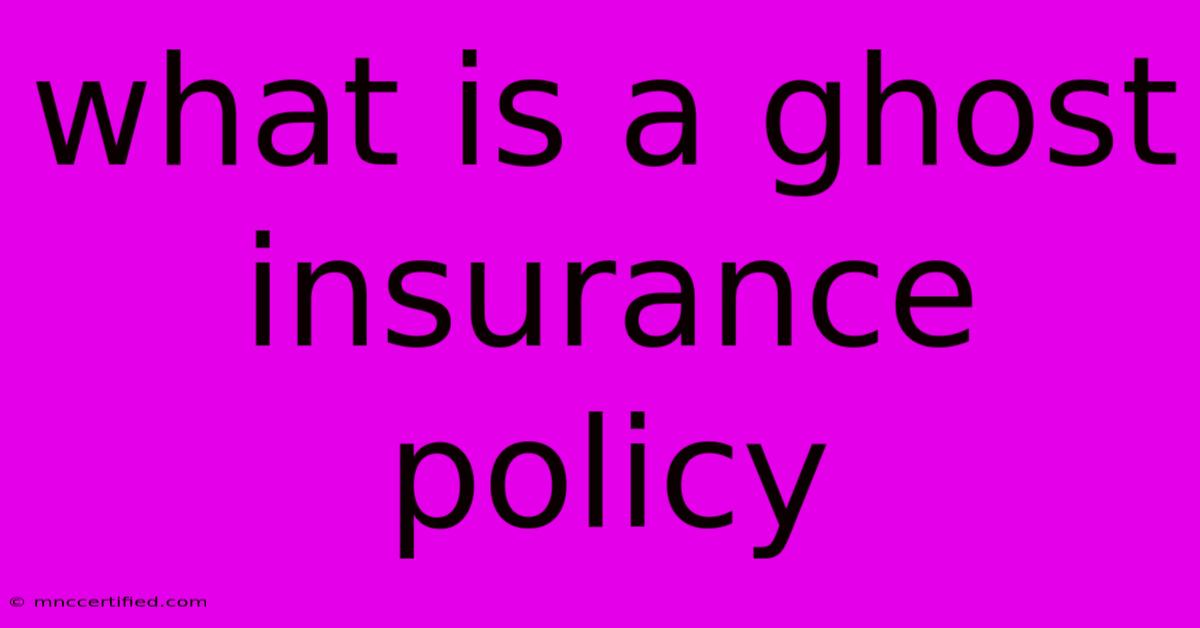What Is A Ghost Insurance Policy

Table of Contents
What is a Ghost Insurance Policy? Uncovering the Hidden Risks
Ghost insurance policies are a shadowy area of the insurance world, representing a significant risk for both businesses and individuals. Understanding what they are and how to avoid them is crucial for financial protection. This comprehensive guide will shed light on this often-overlooked issue.
Understanding Ghost Insurance: A Definition
A ghost insurance policy is a fake or non-existent insurance policy. It appears legitimate, often with forged documentation, but provides absolutely no real coverage. Individuals or businesses who believe they have purchased insurance are left completely unprotected in the event of an accident, loss, or liability claim. This deceptive practice is a form of fraud, and the consequences can be devastating.
How Ghost Insurance Schemes Operate
These schemes typically operate through unscrupulous brokers or agents who:
- Create fraudulent insurance documentation: They generate fake policy numbers, certificates of insurance, and other documents to mimic legitimate policies.
- Collect premiums without providing coverage: The premiums paid by the victim are pocketed by the fraudster, never reaching a legitimate insurance company.
- Target vulnerable individuals and businesses: Those who lack insurance expertise or are under pressure to secure coverage quickly are often prime targets.
Identifying the Red Flags of Ghost Insurance
Recognizing the signs of a potential ghost insurance policy is vital in preventing financial ruin. Be wary of these red flags:
- Unusually low premiums: If the price seems too good to be true, it probably is. Legitimate insurers carefully assess risk before setting premiums.
- Pressure tactics: High-pressure sales tactics designed to rush you into a decision without allowing time for proper research should raise immediate concerns.
- Unregistered or unlicensed brokers: Check the credentials of any broker or agent before engaging their services. Use official regulatory websites to verify their legitimacy.
- Difficulty contacting the insurer or broker: If you're unable to reach the purported insurer or broker, or if contact information is vague or inconsistent, this is a major warning sign.
- Suspicious documentation: Carefully examine all insurance documents. Look for inconsistencies, typos, or signs of forgery. A professional-looking document doesn't guarantee authenticity.
Protecting Yourself from Ghost Insurance
Avoiding ghost insurance requires diligence and awareness. Here's how to safeguard yourself:
- Verify Insurer and Broker Credentials: Always independently verify the legitimacy of the insurer and broker through official channels. Contact the insurance regulator in your region to check for licensing and registration.
- Get Everything in Writing: Never rely on verbal agreements. Secure all insurance documents in writing, including policy details, premium payments, and contact information.
- Compare Quotes from Multiple Insurers: Don't settle for the first quote you receive. Compare offers from several reputable insurers to get a better understanding of market rates.
- Review Your Policy Regularly: Regularly review your insurance policy to ensure its accuracy and that it continues to meet your needs.
- Report Suspicious Activity: If you suspect you've been a victim of ghost insurance, immediately report it to the appropriate authorities and your local consumer protection agency.
The Devastating Consequences of Ghost Insurance
The consequences of falling victim to a ghost insurance policy can be severe:
- Financial Losses: The most immediate consequence is the loss of premiums paid, leaving you without coverage when you need it most.
- Legal Liabilities: In the event of an accident or claim, you'll be personally liable for all associated costs, potentially leading to significant debt.
- Damage to Reputation: For businesses, the lack of insurance coverage can damage their reputation and credibility.
Conclusion: Due Diligence is Key
Ghost insurance is a serious threat. By understanding the risks, recognizing the red flags, and implementing preventative measures, you can significantly reduce the likelihood of becoming a victim. Remember, due diligence and careful research are crucial when obtaining any insurance policy. Don't let the allure of a low price compromise your financial security.

Thank you for visiting our website wich cover about What Is A Ghost Insurance Policy. We hope the information provided has been useful to you. Feel free to contact us if you have any questions or need further assistance. See you next time and dont miss to bookmark.
Featured Posts
-
Car Insurance For Impounded Cars
Nov 22, 2024
-
Arbitration For Insurance Claims
Nov 22, 2024
-
Browns Vs Steelers Winston Game Recap
Nov 22, 2024
-
Hurtigs Goal Sends Arsenal To Quarters
Nov 22, 2024
-
Insurance Claim Attorney Houston
Nov 22, 2024